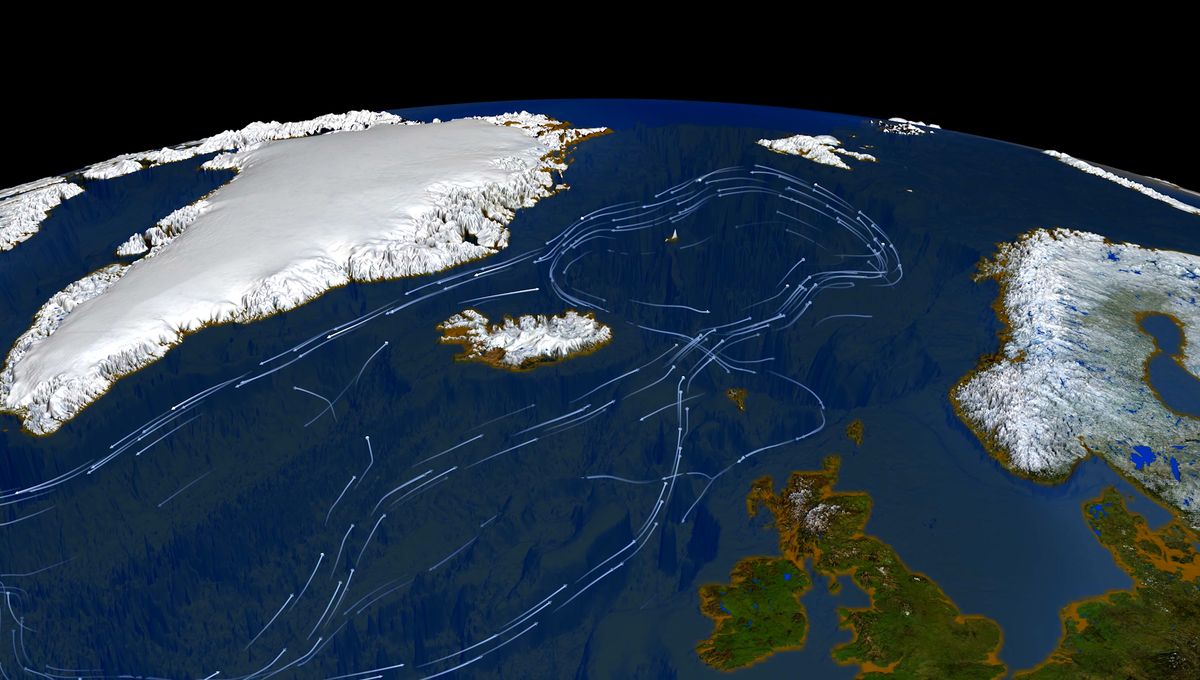
According to a new study, the Gulf Stream has slowed by 4 percent over the past four decades. More worryingly, the researchers are 99 percent certain that the weakening of this important ocean current is more than random chance.
The Gulf Stream plays a significant role in maintaining the climate of the US East Coast and Western Europe. It is part of a larger global system, called “thermohaline circulation” or the “Atlantic Meridional Overturning Circulation”, which operates like a large conveyor belt, distributing heat and energy across the world’s oceans.
The Gulf Stream itself originates near Florida and then carries warm water northwards along the US East Coast towards Canada, before it crosses the Atlantic to Europe. These warm waters help Western Europe experience a warmer climate than it otherwise would, but they also play a role in sea levels and hurricane activity. As such, any changes to the Gulf Stream could have huge implications.
Despite its significance, however, attempts to measure and monitor its strength have varied in their results, which means there is no consensus on whether it is weakening due to climate change. That is, until now.
In their work, Chris Piecuch, a physical oceanographer with Woods Hole Oceanographic Institution, Massachusetts, and Lisa Beal of the University of Miami, Florida, assimilated multiple observational datasets from the Florida Straits to investigate changes in the Gulf Stream’s volume transport since 1982.
The information was collected from three independent datasets – from undersea cables, satellite altimetry, and in situ observations – and analyzed with Bayesian methods. This method allows researchers to measure uncertainty within their models.
The analysis showed significant long-term changes to the Gulf Stream over the last 40 years, the results of which have a high level of certainty.
“We conclude with a high degree of confidence that Gulf Stream transport has indeed slowed by about 4% in the past 40 years, the first conclusive, unambiguous observational evidence that this ocean current has undergone significant change in the recent past,” the authors write.
Importantly, these results are not dependent on any single dataset. Put another way, if you removed any of the three sets of data, you would still see signs of change.
“When you are making your case, you need more than one witness, and you ideally want a collection of independent witnesses whose statements – when taken together – paint a consistent and coherent story,” Piecuch explained in a statement.
“We brought all the witnesses to the stand that we could technically involve to bring all these data sets together. Once we synthesized the testimony from all the different witnesses, they painted a very clear picture that, indeed, over the past 40 years the Gulf Stream has weakened by about 4%, which is significant. It’s more than you would expect if the current was stable; so, it’s an important change.”
“I have been studying western boundary currents – primarily the Agulhas Current off South Africa – for 30 years and it is only now that we are able to observe a robust trend in one of these extraordinarily dynamic systems. I believe this is a profound benchmark,” Beal added.
“Central to this paper is the Bayesian model developed by Chris, which provides a framework to carefully assimilate ocean observations of disparate quality and resolution. I think there is potential for this technique to extract other climate change signals from among the scattered observations we have in the ocean.”
The study provides definitive evidence of the weakening of the Gulf Stream and is a testament to long-term ocean observation and maintaining ocean records.
“The more subtle that the change is that you are looking at, the longer is the observational record that you need to be able to tease that subtle change out of an observational time series”, Piecuch explained.
Beal added, “The Gulf Stream is a vital artery of the ocean’s circulation, and so the ramifications of its weakening are global. I used to think of the ocean as our last remaining frontier, wild, pristine, and indomitable. It saddens me to acknowledge, from our study and so many others, and from recent record-breaking headlines, that even the remotest parts of the ocean are now in the grip of our addiction to fossil fuels.”
The study is published in Geophysical Research Letters.
Source Link: It’s Definitive – The Gulf Stream Is Weakening